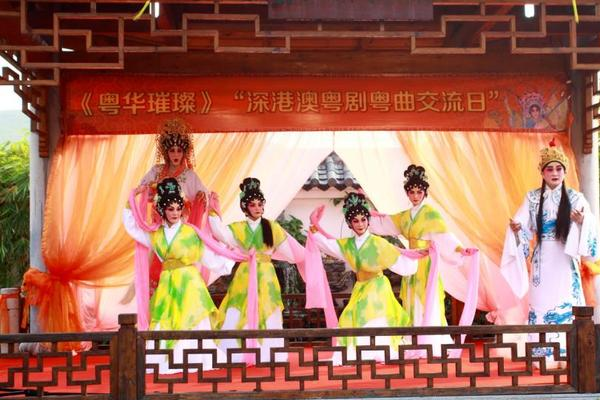Cantonese Opera blossoms at rooftop garden in Luohu



On the roof of the Luohu Commercial City, a major shopping mall in the district, there is a Cantonese Opera club magnetizing fans of the traditional opera from neighboring Hong Kong since it was founded in 2009.
On the roof of the Luohu Commercial City, a major shopping mall in the district, there is a Cantonese Opera club magnetizing fans of the traditional opera from neighboring Hong Kong since it was founded in 2009.
The roof of the shopping mall used to be a warehouse that some persons had taken advantage of to store illegal counterfeit commodities ranging from handbags to clothes. Thanks to the market regulatory and public security departments' joint raid in 2008, the warehouse operation was wiped out, and then replaced by a government-funded complex consisting of a 1,000-square-meter rooftop garden dotted with teahouses, theatres and studios for Cantonese Opera fans.
Since then, the club has developed into a regional center for the traditional category of opera in Southern China, making Shenzhen a vital destination for opera fans from Hong Kong, and a regional center of cultural exchanges on the genre in the Pearl River Delta, along with Guangzhou, Dongguan and Foshan.
The club's operators attribute its success to the popularity of the traditional opera among Hong Kong people.
The eight major teahouses and studios on the roof often cooperate with organizations from Hong Kong and Macao holding Canton Opera activities, turning Luohu into an important hub for folk cultural exchanges among Shenzhen, and two cities.
"Although the founding of the rooftop garden was accidental, as it was a byproduct of a crackdown on trade in counterfeit commodities, its thriving state is not a surprise," said He Sheng'an, deputy manager-general of the shopping mall's property management company.
He Jinglong and Chen Lichang, a couple, set up the first studio in the garden in 2009.
He Jinglong, 48, is from Zhanjiang, Guangdong province, and started learning Cantonese Opera from the age of five, and worked in the opera troupe of Zhanjiang for 10 years after graduating from an opera school.
He came to Shenzhen in 2001 and found a job in a studio for Cantonese Opera on the third floor of the shopping mall where he met his future wife Chen, also a performer then.
He Jinglong compared his life in Luohu to an epitome of the development of the opera industry in the district.
They started their own business after marriage, and their professionalism and hard work, the popularity of the opera among the Hong Kong people and Luohu government support ensured their studio was a success culturally and commercially.
Chen said that almost all Cantonese opera fans in the world today know the rooftop garden club in Luohu, claiming to have the best musicians for the opera anywhere.
Among the large numbers of people flowing to Luohu from the Hong Kong side through the three ports every day, there are always opera fans coming to the rooftop garden club twice a month or even a week to indulge in their passion for the traditional performing art.
They can sing and perform in the studio with local musicians, and record their own albums. The studio also offers their actors' costumes and paraphernalia, as well as make-up assistance so they can fully enjoy their time there.
Every studio has eight to 10 musicians, as well as some professional actors and actresses who can provide guidance to the customers, or perform together with them.
Chen said: "It feels like a whole troupe is at the customer's service, and this is treat for professionals. The price is reasonable, about half of that in Hong Kong."
With Luohu government funding, the rooftop garden club has been renovated, and during the busy season, the customers need to book the studio in advance.
Its managers look forward to the end of the COVID-19 pandemic at an early date, as it has forced their business into dormancy since last year.
They are confident that the more developed the region is, the more people need traditional culture and arts to anchor their souls. And they pledge to do all they can help the government to do a good job in inheriting Cantonese Opera as a traditional cultural heritage, and extending the industrial chains on it so that more people and funds will be attracted to the local genre.










 粵公網(wǎng)安備 44030302000492號(hào)
粵公網(wǎng)安備 44030302000492號(hào)